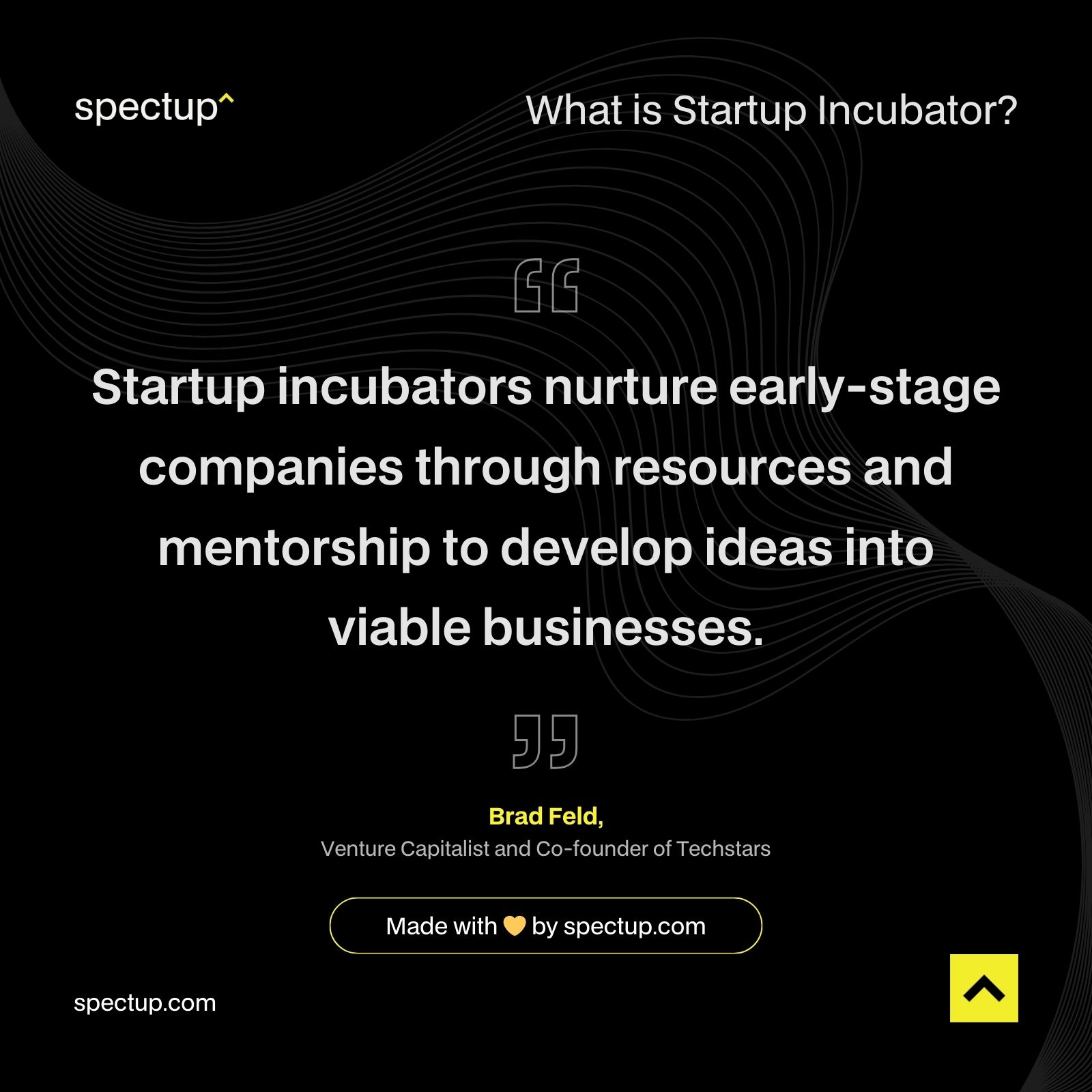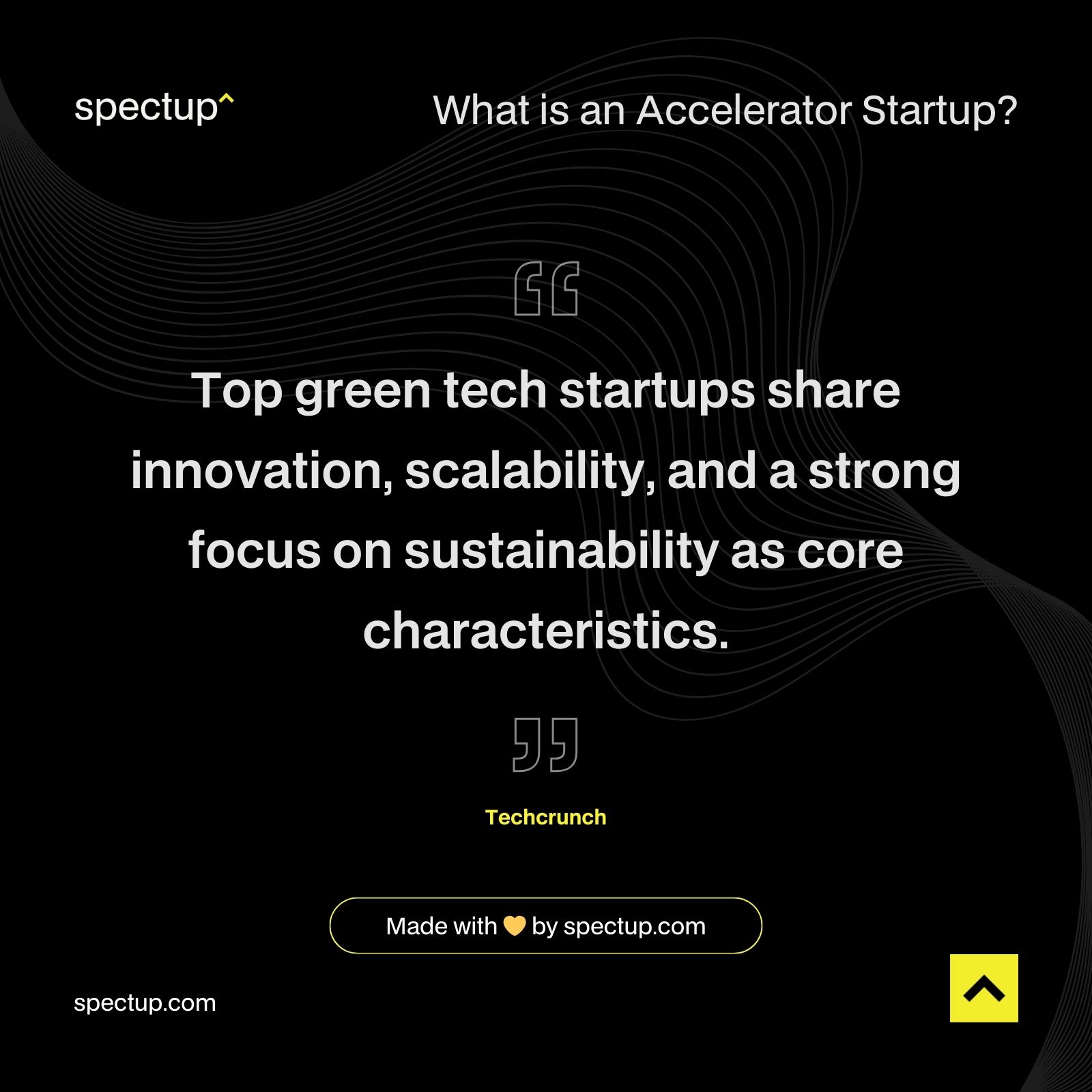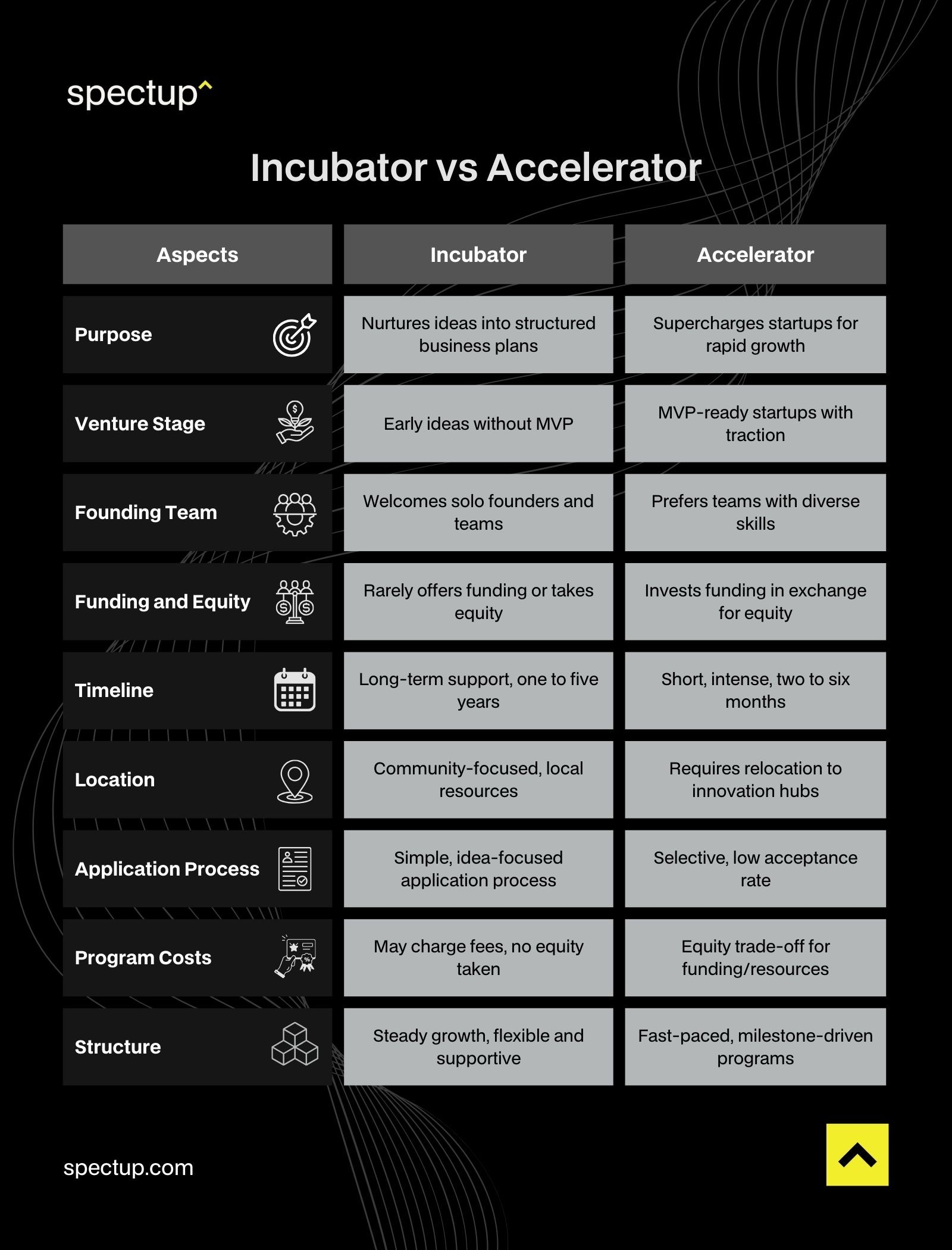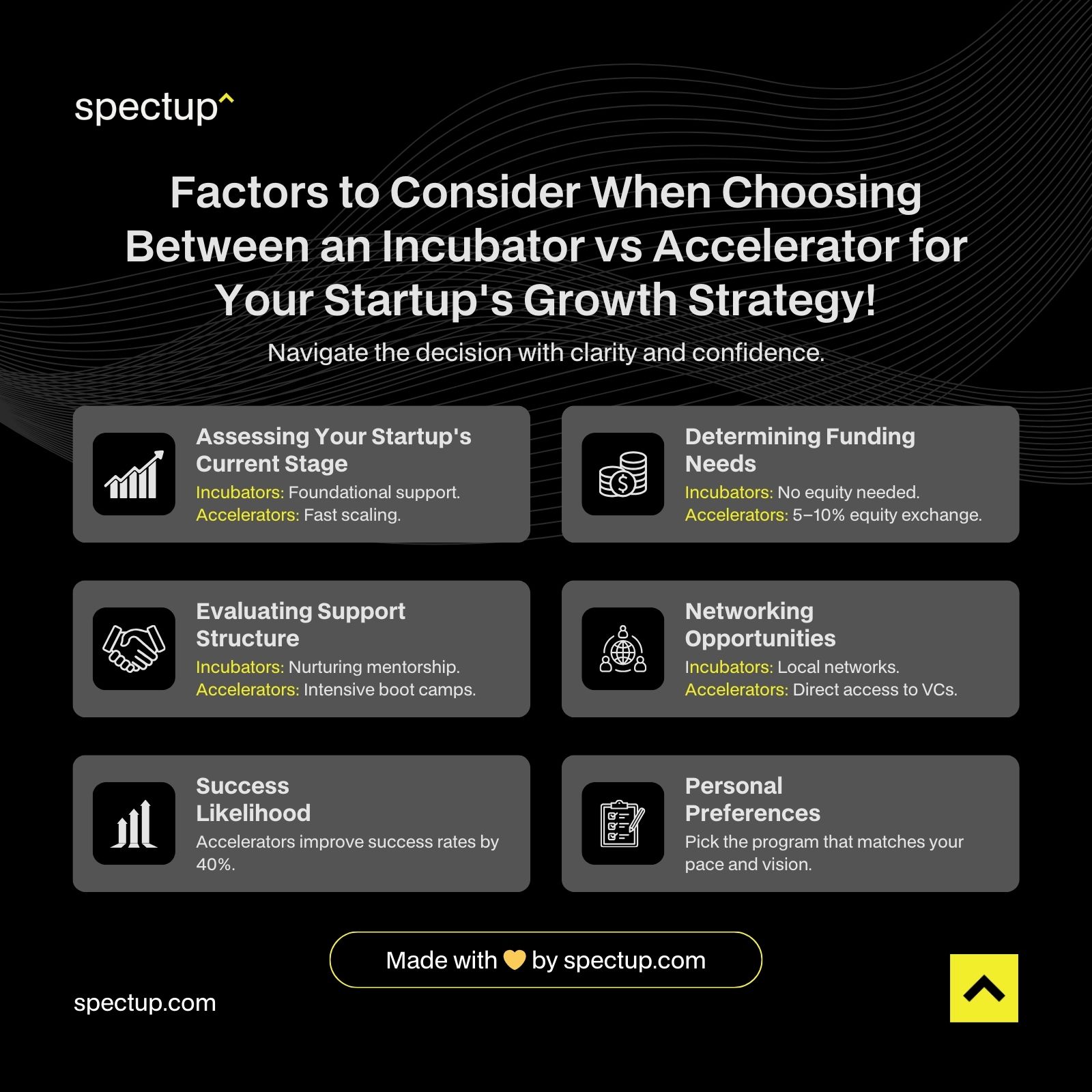Summary
Picture two coffee shops on the same street. One is a cozy café where aspiring writers spend years nursing lattes, sketching ideas, slowly crafting novels. The other is an espresso bar where bestselling authors gather for intense three-month writing sprints, fueled by deadlines and peer pressure. Both produce books. Both serve coffee. But the experience? Completely different.
That's the accelerator vs incubator decision in a nutshell. Starting a business is like running a marathon through a minefield, you need stamina, strategy, and someone in your corner who's seen these explosions before. On top of that, you need to pay a close attention to Capital Raising for scaling.
TL:DR, here you go.
Here's a stat that should make you pay attention: startups with the right support are 3X more likely to actually make it. Not just limp along for a year or two before fizzling out, but genuinely succeed.
But, then a question might start haunting you: how do you pick the right growth partner when you're still figuring out if your idea even works?
From early-stage hand-holding in startup incubators to high-octane rocket fuel through accelerator programs, the options can feel overwhelming. And honestly? Most founders don't even know there's a difference until they've already picked the wrong one. Maybe you just need someone to advise you, so, you should check out spectup as your growth partner.
Whether you're still sketching business plans on napkins (no judgment, some of the best ideas started there) or you've got a scrappy MVP and your first paying customers, this guide breaks down what you actually need to know.
Because picking between an incubator vs accelerator isn't just semantics. It could be the difference between your startup's winning ticket and another "what could have been" story.
Let's figure out which path makes sense for where you are right now.
What is a Startup Incubator?
Think of incubators as greenhouses for business ideas, controlled environments where fragile seedlings get the protection, nutrients, and time they need to grow roots deep enough to survive real-world storms.
You wouldn't toss a seed into harsh soil during a drought and expect it to flourish, right? (Okay, maybe you would if you're the "move fast and break things" type, but let's be honest, that seed's not making it.)
That's exactly why Startup Incubators exist.
Here's what Startup Incubators actually do:
A startup incubator is where your ambitious-but-half-baked idea gets molded, stress-tested, and transformed into something that might actually survive contact with customers. These programs often operate locally through universities, economic development organizations, or even corporate innovation labs, take in entrepreneurs who have promising concepts but need resources, mentorship, and serious help turning napkin sketches into actual business plans.
The incubation period?
Typically one to five years. Yeah, years. Not weeks, not a quick three-month sprint, actual time to figure out what you're building and who's going to pay for it.
And here's why that matters:
Incubator-backed startups in 2025 show markedly higher five-year survival rates than general startups, with figures around 70-87% compared to 44-50% for non-incubated ones.
Startup Incubators aren't about speed. They're about:
Building something that doesn't fall apart the second it leaves the nest.
And if you're still in the "I have an idea but no clue how to turn it into a company" phase?
This might be exactly what you need.
Benefits of Startup Incubator:
Product Development Guidance: Expert advice transforms your concept into a viable product worth building
Market Fit Testing: Experiment with your idea, refining it to find the ideal product-market fit
Workspace Access: Shared physical spaces foster collaboration with other startup entrepreneurs
Networking and Mentorship: Connect with mentors, founders, and investors for invaluable guidance
Legal and Financial Support: Essential counsel lets you focus on growth instead of paperwork
Funding Options: Some incubators offer financial support in exchange for equity
Which Startup Incubators are best for startups:
TechNexus: Bridges young startups with established corporations, building mutually beneficial relationships
Capital Factory: A Texas hub for tech entrepreneurs to secure funding and network
Seedcamp: Focused on Europe, providing resources and early funding for tech founders
Harvard Innovation Labs: Helps students and alumni with tailored support, especially in life sciences
If you are looking for fundraising consultancy services, we are here to partner with you and help you secure deals.

What is an Accelerator Startup?
Imagine your startup as a race car already on the track. You've got the engine revving and momentum building, but you're stuck in second gear. A startup accelerator? It's the turbo boost that gets you to the finish line faster, sometimes uncomfortably fast.
What Actually Is a Startup Accelerator? (Buckle Up)
Imagine your startup as a race car already on the track. The engine's running, you've got some speed, customers are actually using your product,but you're stuck in second gear watching competitors zoom past you.
A startup accelerator? That's the turbo boost that rockets you from "promising startup" to "wait, how did they scale that fast?"
Sometimes uncomfortably fast.
Like, "did we just hire 15 people and launch in three new markets in the same quarter?" fast.
And if you really scaled that fast, make sure to have capital advisory experts with you onboard, so youcan save your time while fundraising.
Here's how Startup Accelerators work:
Accelerator programs are built for founders who are done figuring things out and ready to execute at a pace that would make most people nauseous.
They're cohort-based, meaning you join a tight-knit group of fellow entrepreneurs in a "we're-all-suffering-together-and-it's-kind-of-beautiful" boot camp experience.
Usually 3-6 months of pure intensity.
You're not gently exploring options here, you're sprinting through everything from fundraising to growth hacking to hiring to customer acquisition, all while mentors, investors, and program directors push you harder than you've ever been pushed.
Think of it as startup grad school, except you're building a real company under a microscope while running on four hours of sleep and cold brew.
And here's why people put themselves through it:
Over 40% of startups graduating from accelerator programs secure follow-on funding.
Obviously, it's proof that the "accelerating" part isn't just a hype of social media or about trending reels. These programs work because they force you to:
Move faster
Think bigger
Execute better than you would on your own.
But (and this is important): accelerators aren't for everyone. If you're still validating your idea or figuring out who your customer is, this probably isn't your moment. Come back when you've got traction, a product people actually want, and the stomach for controlled chaos.
Benefits of Startup Accelerator Programs:
Funding with a Catch: Accelerators invest for equity; Y Combinator provides $500,000 for a 7% stake
All-You-Can-Learn Buffet: Intensive masterclasses cover product development, marketing, and scaling
Networking Opportunities: Cohorts connect globally with industry-wide networking opportunities
One-on-One Mentorship: Industry mentors offer focused insights and guidance
The Best Startup Accelerators that are making Founders win fortunes:
Y Combinator: Famous for its $500,000 investments; alumni include Dropbox and Airbnb
Techstars: Provides up to $120,000 for 6% stake, offering virtual, in-person, and hybrid programs
Founder Institute: Groups startups by stage, providing targeted support for Launch and Growth tracks
Startupbootcamp: Runs industry-specific programs worldwide in healthcare, fintech, and clean energy

Accelerator vs Incubator: Which One Actually Fits Your Startup?
Startup incubator vs accelerator are like the yin and yang of early-stage business growth, complementary, but fundamentally different beasts. Incubators nurture raw ideas into viable business plans. Accelerators supercharge young startups into fast-growth machines.
Confuse the two, and you'll either waste months in the wrong program or get rejected from one you were never ready for in the first place.
Let's break down what actually separates them:
Purpose: What Are You Actually Getting Into?
Incubator:
Think of an incubator as the safe haven where fledgling ideas hatch like baby birds. You're at the "I've got a big idea but no clue how to execute it" phase, and an incubator helps transform that spark into an actual structured business.
They provide:
Office space
Access to industry experts
Legal advice
Introductions to potential partners.
So, basically everything you need to stop winging it and start building something real is included in Incubators.
Accelerator:
Accelerators are rocket fuel. For early-stage companies that already have a minimum viable product and some traction, they condense years of painful learning into a few brutal months of execution.
If incubators are the nurturing hand that feeds you, accelerators are the push off the ledge to see if you can actually fly.
Spoiler: you better figure it out fast.
Venture Stage: Where You Need to Be Before Applying
Incubator:
Welcomes startups in the early idea stage, when you're still developing concepts, sketching out business models, and figuring out if this thing could even work.
You don't need an MVP.
You don't need customers.
You just need a high-potential idea and the determination to see it through.
Accelerator:
Only works with early-stage startups that have an MVP and a solid business model already in place. They want something tangible to scale. If you're still validating your idea or hunting for product-market fit, you're not ready. Come back when you've got proof this thing works.
Funding and Equity: What's It Going to Cost You?
Incubator:
Most incubators don't invest directly in your startup.
They focus on providing resources, workspace, mentorship, connections.
But the best part is they take all this without taking a slice of your company.
Some do offer seed funding, but it's not the default.
Do your homework and find programs that align with your funding needs.
Accelerator:
Almost always offer direct funding in exchange for equity.
Programs like Y Combinator and Techstars typically invest anywhere from $20K to $120K for stakes around 5-10% of your company.
This equity-based model attracts ambitious startups ready to trade ownership for speed, mentorship, and access to serious investor networks.
If you are looking to partner with top fundraising consultant firms, we are here for you to raise capital and secure your funding deals.
Just remember: that 7% you give up now could be worth millions later. Make sure the trade-off is worth it.
Timeline: Marathon vs Sprint
Incubator:
Take the long-game approach, think one to five years. There's no rush, often no set end date for using resources. You can fine-tune every aspect of your business without the constant pressure to hit milestones or graduate on schedule.
It's slower
Less glamorous
But, sometimes that's exactly what you need to get it right.
Accelerator:
Works on short, intense schedules, usually three to six months of pure, unfiltered startup boot camp.
You're in a cohort working side-by-side with other startups
Cramming workshops, mentorship sessions, pitch practice, and existential crises into every single week.
By the end, you're either ready to raise your next round or completely burned out. Often both
Application Process: How Hard Is It to Get In?
Incubator:
Typically has simpler, more accessible application processes.
They're betting on your idea's potential, not your proven track record.
You demonstrate that your business concept has promise and market viability, and if they believe in you, you're in.
Accelerator:
Brutally selective. Acceptance rates hover around 1-3%, roughly the same odds as getting into Stanford or Harvard. Programs like Y Combinator receive tens of thousands of applications and accept a few hundred.
They demand startups that can:
Demonstrate high scalability potential
Proof of product-market fit
A team that can execute under extreme pressure.
If you're not ready, the rejection email will arrive faster than you can say "pivot."

Factors To Consider When Choosing Between An Incubator Vs Accelerator For Your Startup's Growth Strategy!
Choosing between startup incubators for 2026 and accelerator programs for startups can feel like picking the perfect Netflix series, both thrilling and daunting. Here are key factors to navigate this decision like a pro.
Assessing Your Startup's Current Stage
Incubators support entrepreneurs, often offering coworking space and access to academic institutions or government entities for guidance, perfect for startups still defining their footing. Business incubators can be ideal for those needing time to nurture and grow their foundations.
Accelerators cater to growth-stage companies, startups with paying customers and strong founding teams ready to scale fast.
A Global Accelerator Network report found that accelerators increase a startup's likelihood of success by nearly 40%. If your startup has traction and clear direction, an accelerator's rapid growth model could be the right match.
• Incubators: Ideal for early-stage, foundational support
• Accelerators: Best for scaling quickly with clear product-market fit
Determining Specific Funding Needs
Incubators often help startups find initial funding sources and partnerships with angel investors or government grants. Many provide office space and resources without taking equity, letting you grow without surrendering ownership.
Accelerators usually come with equity exchange. You'll receive larger capital chunks, but you'll give up ownership. According to Seed-DB, accelerator programs typically take 5-10% equity in exchange for funding.
Incubators: Provide initial grants and funding with no equity requirement
Accelerators: Offer higher funding but require 5-10% equity
Make sure while scaling up your fundraising strategies, you must have financial modeling experts in your team to avoid any issues later in securing deals.
Evaluating Support Structure Preferences
Incubators foster highly supportive environments for new entrepreneurs, providing structured programs, mentorship, and sometimes coworking spaces. This setup is perfect for early-stage entrepreneurs still connecting the dots who need nurturing environments to grow.
Accelerators offer intensive, short-term coaching designed to propel businesses fast. With typical programs lasting three to six months, these are the "boot camps" of business accelerators.
Statistics show startups going through accelerator programs have a 30% higher survival rate after five years, thanks to rigorous support and frequent feedback loops.
Incubators: Provide structured, nurturing mentorship, ideal for hands-on guidance
Accelerators: Intensive, short-term coaching for rapid growth
Networking Opportunities
Business incubators are well-suited for startups needing time to establish themselves within local communities, tapping into academic institutions, industry experts, and other entrepreneurs. This collaborative environment lets startups grow roots before reaching paying customers.
Accelerators typically connect startups with seasoned founders, venture capital firms, and networks of potential investors.
Research suggests that nearly 80% of successful startups from accelerator programs secure funding within six months after graduation.
If building partnerships and attracting investors are priorities, this may be your route.
Incubators: Focus on local networking, ideal for community-based growth
Accelerators: Provide direct access to investors and venture capitalists
Networking with right investors is quite important in terms of successful and intentional fundraising, spectups helps you connect with investors that are pre-vetted by our experts team and helps you save time.

Wrapping Up:
Think of incubators as startup "nurseries", controlled environments that nurture early ideas with patience, care, and zero pressure to bloom before you're ready. Accelerators? They're rocket boosters, propelling startups that are already built and burning fuel straight into orbit at speeds that'll either thrill you or terrify you (probably both).
The accelerator vs incubator decision ultimately comes down to one honest question: where are you right now?
Not where you wish you were. Not where you think you should be based on that LinkedIn post from your college roommate who just raised a Pre-Seed. Where you actually are, today, with the product and traction you actually have. Contact spectup, if you stumble in your way.
Niclas Schlopsna
Partner
Ex-banker, drove scale at N26, launched new ventures at Deloitte, and built from scratch across three startup ecosystems.









